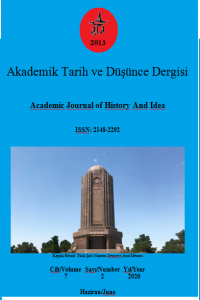Tarih Metodu Açısından Olayın Tanımı ve İzahı
Tarih, geçmiş, bugün ve gelecek arasında irtibatı sağlayan dinamik bir süreç ve insan fiillerinin toplamıdır.Bu anlamda üç boyutlu zaman denilen, geçmiş, bugün ve gelecek imgeleminde yaşanmış/yaşanan/yaşanacak olan hallerinin toplamı olarak tarih, insandan izler taşır ve ondan ayrı düşünülemez.İnsanın tüm varlığı ile katıldığı bu süreç, aynı zamanda onun tarihselliğini oluşturur.Esasen tarih, ne geçmişin hikayesi ne de olup bitmiş olayların cansız tanığıdır.Bu bağlamda gelişen insanlığın bunu fark etmesi ve sorgulama yoluna gitmesi sorgulayıcı tarih anlayışının da önünü açmıştır.Bu süreçte tarihin bağımsız bir disiplin haline gelerek, kendine özgü metodoloji ve çalışma yöntemleri söz konusu olmuştur.Buna göre bu çalışmada tarihin kavramsallığı ve kavram kökeninden hareketle tarih metodu açısından olayın tanımı ve izahı ilgili literatür taranarak ortaya konulmaya çalışılmıştır. Tarihsel olay, literatürde yer aldığı haliyle açıklanırken olayların oluşumuna dair tespitler ve yorumlar da analitik olarak ortaya konulmuş, argümanlar ise tablolarla gösterilmiştir.Tarihsel olayların oluşumuna dair tespit ve yorumlar anlatılırken mikro kod ve gensel devinim kavramları kullanılmış; olayın oluşum süreci gensel devinim kavramıyla; olayların kökeninde yer alan insani, sosyal, siyasal, kültürel vb. oluşum künyeleri ise mikro kod kavramıyla anlatılmıştır.
Anahtar Kelimeler:
Tarih, Olay, Tarihsellik, Mikro kod
Definition and Explanation of Event in Terms of Historical Method
History is a dynamic process that provides contact (connection) between today and future, and is sum of human actions. In this sense, as sum of states, happened/being happened/to be happened on imagination of the past, today and next, called as three dimensional time; history bears traces from human and can not be thought apart from it. This process, which human has participated with one’s all being, at the same time constitutes its historicalness. Essentially, history is neither story of the past, nor is non-living witness of the happened&ended events. Developed in this context, humanity’s realization and its resorting to question paved the way for inquirer (questioner) conception of history, as well. During this process, there were history’s distinctive methodologic and operational (working) methods, becoming a independent discipline. According to this, in the study, we tried to reveal conceptuality of history, and definition and explanation of the event (case) in terms of historical method based on origin of the concept, by reviewing literature. While historical event (case) was explained as it takes place in the literature, also determinations and comments were sugggested analytically, and arguments were demonstrated by tables. While determinations and comments on occurrence of historical events were explained, we used concepts of micro code and genetic motion (movement); on the one hand, formation process of the event is explained by the concept of genetic motion; and such formation tags (mastheads) which take place in the origin of events, as human, social, political and cultural etc. were by the concept of micro code.
Keywords:
History, Event, Historicalness, Microcode,
___
- ACUN, F., ‘’Tarihte Objektiflik Tartışması’’, Muhafazakar Düşünce Dergisi, 2, sy.7 (2006): 109-125.
- ………….. ACUN, F., ‘‘Yakın Dönem Tarih Metodolojisi’’,Atatürk Araştırma Merkezi Dergisi, (1998):717-756.
- ACUN, R., ‘’Konjonktür, Tarih ve Tarihçi: Metot Vurgulu Bir Araştırma’’, Hacettepe Üniversitesi EdebiyatFakültesiDergisi, sy.1, (2015): 15-28.
- Aristoteles, Poetika, çev. İsmail Tunalı, İstanbul: Remzi Kitapevi,1987.
- ARSLAN, A., ‘’İbni Haldun ve Tarih’’, Tarih İncelemeleri Dergisi, (2015): 9-30.
- CAN, A.- TAŞÇI, U., ‘’Teoriler Işığında Toplumsal Olaylarin Gelişimi ve Yönetimi’’,Fırat Üniversitesi Sosyal Bilimler Dergisi, 26, sy. 1, (2016): 151-170.
- CARR, E.H., Tarih Nedir, çev: Misket Gizem Gürtürk, İstanbul: İletişim Yayınları, 2002.
- FUKUYAMA, F., Tarihin Sonu ve Son İnsan, çev. Zülfü Dicleli, İstanbul: Gün Yayınları, 1999.
- Yayın Aralığı: Yılda 6 Sayı
- Başlangıç: 2013
- Yayıncı: Hakan YILMAZ
Sayıdaki Diğer Makaleler
Şah İsmail: Hayatı ve Şahsiyeti
Yegane ÇAĞLAYAN, Erhan ÇAĞLAYAN
Biləcik və Göynük: Oğuz türklərinin ən qədim yurd yerləri
Bakı Neft Sənayeçiləri Qurultayının Peterburqda nümayəndəliyinin açılması məsələsinə dair
Azerbaycan’da Hüküm Sürmüş Bir Türk Devleti: Sâcoğulları (IX-X. Asır)
ОТКРЫТИЕ ШКОЛЫ ПРАПОРЩИКОВ В ГЯНДЖЕ – НАЧАЛЬНЫЙ ПУТЬ К СОЗДАНИЮ НАЦИОНАЛЬНОЙ АРМИИ
